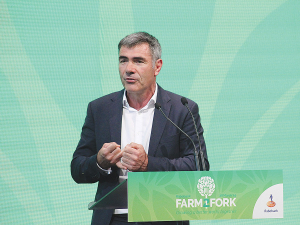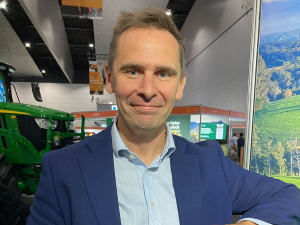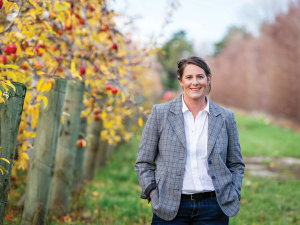National has five ‘bottom lines’ for the Zero Carbon Bill likely to come before Parliament in the next month or two, says primary industries spokesman Nathan Guy.
“The first one is that the decisions need to be science based,” he told an audience of about 1300 farmers and agribusiness professionals at Rabobank’s Farm2Fork seminar in Sydney on March 28.
“The second one is we need long-term procedures. The third one is we need to be at pace with our global trading partners. Fourthly, new technologies are going to be vitally important as we try to wrestle these emissions down
“And another one is we don’t want to bankrupt the sector or the country in the process.”
Guy told Dairy News it will be interesting to see if the Bill gets cross-party support.
Meanwhile the Parliamentary Commissioner for the Environment’s recently released report ‘Farms, Forests and Fossil Fuels’, concludes that agriculture and farm emissions should be treated separately, Guy told the seminar.
“And if biological emissions are going to go into the Emissions Trading Scheme then that funding, tax or levy that could be struck should go back into those communities where it has come from to focus on greenhouse gases, water quality and biodiversity.
“I applaud the commissioner [Simon Upton] for his foresight and thinking.”
Guy said it would be a crude measure if biological emissions were measured at the processor level such as kilos of milk solids or kilos carcase weight.
“It needs to be measured inside the farmgate; that is why I support farm plans. I salute DairyNZ what it has done with 44 pilots; that information is readily available and the research conclusion is that no one size fits all.
“A levy at the processor level will be seen just as crude tax and won’t change behaviour.”
One billion trees has been a real focus in New Zealand, Guy says.
“Yes we need to plant more trees… but the challenge is, are the trees going to be planted in the right place? This is looking out 30 years and we don’t want to see rural schools’ rolls decline, jobs leave these rural communities and local roads get smashed.”
More trees need to be planted but in a way that recognises the importance of infrastructure and jobs.
Guy says New Zealand, Australia and some European countries are leading the way on biological emissions research and technology is the way to wrestle these things down -- not more taxes.
Biotechnology needs to change in New Zealand, he says.
“We have GE ryegrasses that have to go to the US for field trials and the early research has shown that will reduce methane by 23%... We can’t do those trials in New Zealand.”
Guy says since the 1980s our farmers have been leading change.
“Our subsidies came off, there was huge change and it was really painful. Some people have been saying to me ‘it feels like we are back there again now’.
“We have a huge amount of headwind we have to navigate our way through.
“Because of the adaption we do inside our farmgate I am positive we can get there with the right signals.”

















